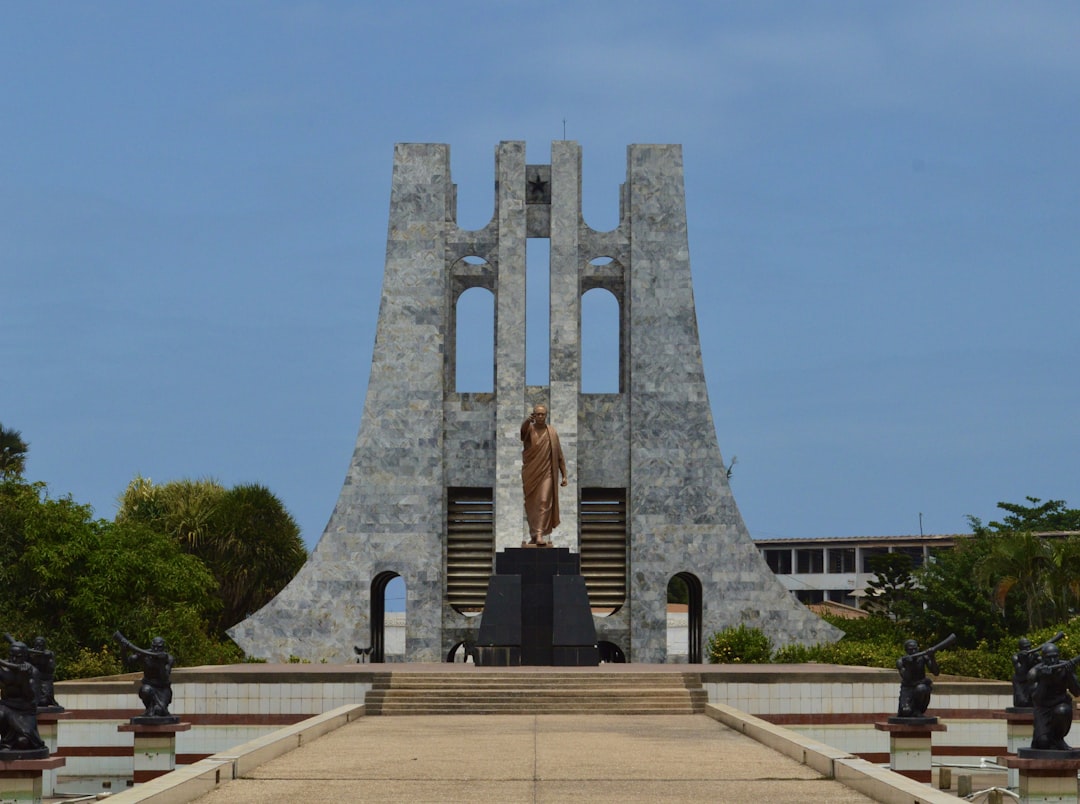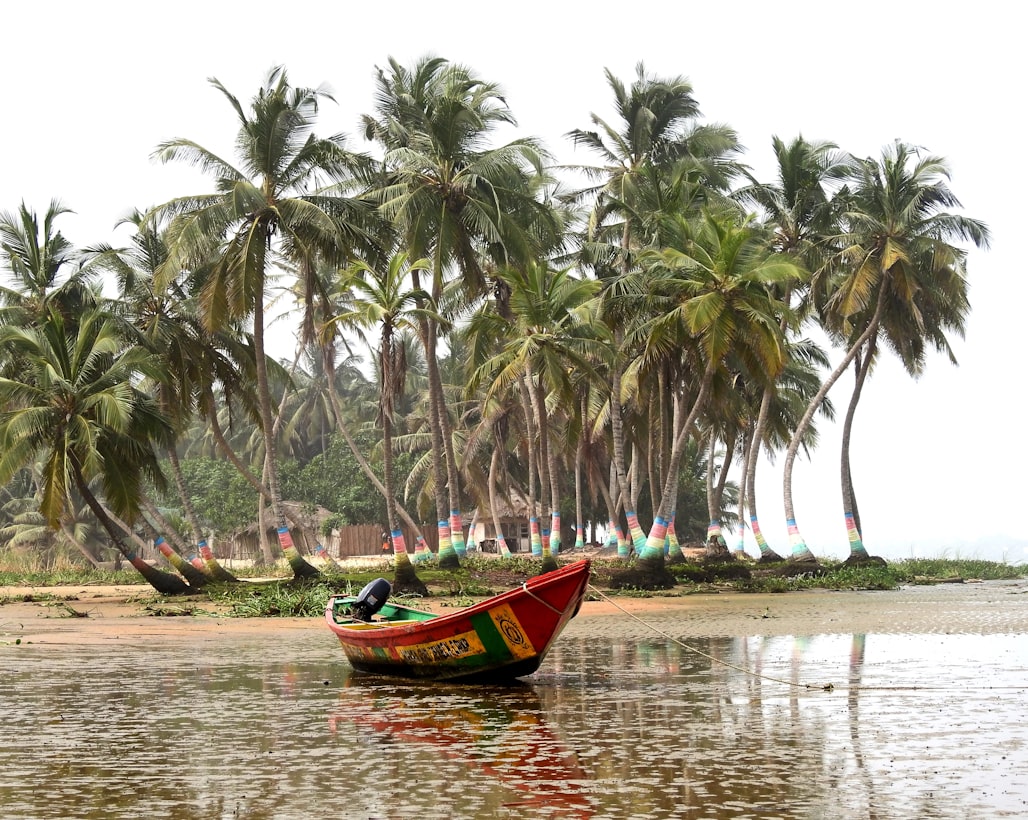Top Attractions
Ghana is teeming with culturally and historically significant attractions. Begin with Cape Coast Castle, a UNESCO World Heritage Site that provides a sobering glimpse into the transatlantic slave trade. The vibrant capital, Accra, offers sites such as Independence Arch, Jamestown’s lighthouse, and the bustling Makola Market. In the Volta Region, Wli Waterfalls – the highest in West Africa – are nestled among lush forests and offer a serene retreat. Mole National Park in the north is a top destination for wildlife lovers, featuring elephants, antelopes, and monkeys roaming freely. For a scenic beach experience, Busua Beach and Kokrobite offer surf-friendly waves and local vibes. Lake Volta, one of the largest man-made lakes in the world, provides opportunities for boat cruises and fishing adventures.
Local Dishes
Ghanaian cuisine is bold, flavorful, and diverse across its regions. A staple dish is jollof rice, a tomato-based rice dish typically served with fried plantains and grilled chicken or fish. Fufu, made from pounded cassava and plantain, is usually served with soups like groundnut soup or light soup. Banku, a fermented corn and cassava dough, is often paired with spicy tilapia and shito (hot pepper sauce). Red-red, a dish made with beans and fried plantains, is a favorite for vegetarians. Street food culture is strong—try kelewele (spicy fried plantains) or chichinga (kebabs) for a quick and satisfying snack.
Transportation Tips
In major cities like Accra, tro-tros (shared minibuses) are the most common and affordable form of transportation, though they can be crowded and lack fixed schedules. Taxis are widely available, but it’s best to agree on a fare in advance or ensure the meter is used. Ride-hailing apps like Bolt and Yango are becoming increasingly reliable and convenient in urban areas. For long-distance travel, intercity buses like STC and VIP offer comfortable services between major towns. Roads in rural areas can be rough or unpaved, so consider renting a 4x4 vehicle if venturing off the beaten path. Be prepared for traffic congestion in major cities, particularly during rush hours.
Budget Travel Tips
Travelers on a budget can find numerous low-cost accommodations, especially guesthouses and hostels in areas like Kokrobite, Cape Coast, and Tamale. Street food is both affordable and delicious, often costing less than $2 USD for a full meal. Entrance fees for many attractions are minimal, and some cultural sites even offer free tours. Consider traveling during the off-peak season (April to June or September to November) for cheaper lodging rates and fewer crowds. Public transportation, especially tro-tros, keeps costs down, though it may require patience. Bargaining at markets is common—don’t be shy to negotiate for a better price.
Safety Info
Ghana is considered one of the safest countries in West Africa for travelers, but it’s always wise to exercise caution. Petty theft, especially in crowded markets or transit areas, can occur—keep your valuables secure and avoid flashy jewelry. Avoid walking alone at night in unfamiliar neighborhoods. Respect local customs and ask for permission before taking photos of people or culturally significant places. Malaria is present, so anti-malarial medication and mosquito repellent are essential. Always drink bottled or filtered water to avoid waterborne illnesses.
Cultural Etiquette
Ghanaians are generally warm and hospitable, and greetings are a fundamental part of daily life. Always greet people when entering a home, shop, or village, as failing to do so may be seen as rude. Dress modestly, especially when visiting rural areas or religious sites—covering shoulders and knees is appreciated. Using your left hand for eating, giving, or receiving is considered impolite. It's customary to offer and accept items with the right hand or both hands. Showing respect to elders is deeply valued, and when sitting with others, crossing your legs might be seen as disrespectful.
Travel Style Fit
Ghana is ideal for cultural explorers and history lovers, offering deep insights into West African heritage and post-colonial narratives. It’s also a rewarding destination for eco-travelers and wildlife enthusiasts, with national parks and coastal biodiversity. Beach lovers will find plenty of serene coastlines, while backpackers on a budget will appreciate the affordability and friendliness of local communities. Foodies, photographers, and festival-goers will all find Ghana to be a country full of vibrant experiences and warm welcomes.

Best Time to Visit
The best time to visit Ghana is during the dry season, which runs from November to March. This period offers warm, sunny days perfect for exploring the beaches, hiking in the national parks, or visiting historical sites. December is particularly festive, with events like Afrochella and Detty December drawing crowds of travelers from across the globe. The rainy season, from April to October, can make some roads impassable and might hinder travel plans, though it also means lush greenery and fewer tourists.
Accommodation Recommendations
For low-budget travelers, Sleepy Hippo Hotel in Accra offers affordable dorms and private rooms in a sociable setting. In Cape Coast, Oasis Beach Resort provides basic but cozy beachfront huts at reasonable rates, perfect for backpackers.
Mid-range travelers may enjoy Urbano Hotel in Accra, which offers modern amenities with a local twist, or Coconut Grove Beach Resort in Elmina, which combines comfort with oceanfront views and proximity to historical landmarks.
Luxury seekers can unwind at Kempinski Hotel Gold Coast City in Accra, a five-star hotel known for its exquisite service, poolside ambiance, and central location. Another great option is Zaina Lodge in Mole National Park, where guests can enjoy upscale safari-style accommodations with direct access to wildlife viewing.
Languages Spoken
English is the official language and is widely spoken, especially in urban areas and for administrative purposes. However, Ghana is a multilingual country with over 80 languages. Twi (Akan), Ga, Ewe, and Dagbani are among the most commonly spoken indigenous languages. Learning a few basic phrases in Twi can be a great way to connect with locals and show respect for the culture.
Currency
The official currency is the Ghanaian cedi (GHS). Credit cards are accepted in some hotels and larger establishments in Accra, but cash is essential in smaller towns and markets. ATMs are widely available in urban centers but can be scarce in rural areas. It's advisable to carry enough cash when traveling outside the cities.
Common Traveler Mistakes to Avoid
One common mistake is underestimating travel times due to road conditions or traffic congestion—always plan with buffer time. Travelers often forget to take anti-malarial precautions or skip vaccines like yellow fever, which is required for entry. Not carrying small bills can lead to difficulties in taxis or local shops, so it's best to keep change handy. Another pitfall is assuming everyone accepts card payments—cash remains king in most parts of the country.
Essential Apps & Tools
Download Maps.me or Google Maps for offline navigation, and use XE Currency for currency conversions. Ride-hailing apps like Bolt are essential in Accra. MoMo (Mobile Money) is widely used for cashless payments—registering for a local SIM card can help facilitate this. GhanaPost GPS is the national addressing system app and is particularly useful when navigating lesser-known locations.
Suggested Itinerary Styles
A well-balanced 10-day itinerary could begin in Accra with city exploration and cultural immersion, followed by a trip westward to Cape Coast and Elmina for historical sites. Then head north to Mole National Park for a safari experience and end your journey with a relaxing few days on Busua Beach. Travelers with more time can venture east to the Volta Region for waterfalls and mountaintop hikes.
Fun Facts
Ghana was the first sub-Saharan African country to gain independence from colonial rule, achieving this in 1957. The country is known for its vibrant kente cloth, a traditional textile woven in colorful patterns that tell stories through their designs. Ghana is also home to the mysterious Larabanga Mosque, one of the oldest mosques in West Africa, built in the 15th century. The country hosts elaborate funerals that can be more festive than somber and often include custom-made “fantasy coffins” shaped like animals, cars, or objects that reflect the deceased’s life.
